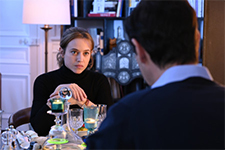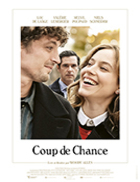Coup de Chance
|  Although a vast improvement over his previous two films, the romantic comedies Rifkin’s Festival (2020) and A Rainy Day in New York (2019), which were borderline insufferable and amusingly out of touch, respectively, Woody Allen’s Coup de Chance, his fiftieth feature film and his first to be shot in a foreign language, comes tantalizingly close to being a “return to form.” However, there is so much about it that feels so familiar and so little that qualifies as daring or innovative that is hard to get too excited about it. Defenders of Allen’s oeuvre will no doubt find much to chew on here, and there are isolated moments that are quite great, but much of it is also depressingly pro forma, moving through the motions of a familiar set of characters and situations in the service of a philosophical point that is clever, but hardly invigorating. Set in Paris, the story revolves around one of Allen’s favorite motifs: the extramarital affair. In this case, the affair begins with a chance meeting on the street of Fanny Fournier (Lou de Laâge), an art dealer, and Alain Aubert (Niels Schneider), a writer. They knew each back in high school, when Fanny was more of bohemian intellectual like Alain is now, and he makes no attempt to hide how much of a crush he had on her (and clearly still does, hence his need to make note of said crush). Now married to an extremely wealthy financier named Jean (Melvil Poupaud), Fanny lives a pampered life of penthouses, constant service, country weekends, and many, many dinner parties and soirees in which wealthy people talk about food and wine and food. She is pretty and personable, so she manages well enough among the Parisian one-percenters, but she is clearly somewhat uncomfortable with being part of the upper crust. Alain’s rough-hewn, “authentic” presence reminds her of who she used to be, and that is why she finds herself drawn to him beyond just casual lunch dates. Like Match Point (2005), Coup de Chance begins as a society drama and then morphs into a suspense thriller once Jean discovers the affair and decides to deal with it in his own way, which reveals a dark side of his wealth and power that had previously been suggested, but not confirmed. Murderous deeds are done and covered up, but not so well that clues can’t be followed, which turns Fanny’s busy-body mother, Camille (Valérie Lemercier), into an amateur sleuth who becomes determined to reveal her son-in-law’s treachery. As with Allen’s previous murder stories, he seems to be less interested in the mystery of will he or won’t he get caught than he is in the fall-out. That is, what effect does murdering someone and getting away with it (if only for a while) do to that person and what effect does the deed have on those around him? In Crimes and Misdemeanors (1989), which remains one of Allen’s greatest accomplishments, the answer is a despondent capitulation to the worst of humanity’s potential for evil. In Match Point, the answer is quite the opposite, posing instead that even those who “get away with it” may very well be destroyed anyway. Coup de Chance, as the title suggests (it means “stroke of luck”), posits another answer, essentially saying that life is completely random and therefore much of it is simply out of our control. Allen puts a positive spin on this randomness by suggesting via Alain’s writing that every life is precious simply because it is such a random event with almost impossible odds of ever having occurred. “Everyone’s life is a miracle,” he says, so it is important not to squander it. The idea that luck is central to one’s existence is a brutal fact to swallow, especially for Americans whose individualistic outlook insists on taking full credit for all achievement. Allen has a more absurdist view, which is the only thing that can possibly justify the film’s otherwise ridiculously ironic deus ex machina ending, which works on paper when you put all the pieces together, but in the moment just feels … well, absurd. And that is a major problem with the film, whose time-worn characters and plot can only be justified in the service of a larger point. Allen certainly delivers in that regard, but it doesn’t feel terribly profound or insightful—more of a dinner-party riff on the what-if elements of chance. The actors acquit themselves well and avoid the pitfalls of solipsism that have buried the protagonists in Allen’s recent films. Lou de Laâge’s Fanny is an intriguing spin on Allen’s longtime concern with the risk of intellectuals and artists selling out to monied society, while Niels Schneider manages to play the heroic academic without feeling like he’s doing an Allen impersonation. And Melvil Poupaud finds just the right notes of Jean’s deep malice hidden by social niceties and well-heeled grace, although some of his furrowed glares feel a bit too self-consciously Kubrickian. The cinematography by the great Vittorio Storaro, who has shot all of Allen’s films since Café Society (2016), is not surprisingly gorgeous, although the film’s tone is more often undercut than enhanced by Allen’s choice of music, in this case vintage jazz, especially Herbie Hancock’s 1964 standard “Cantaloupe Island.” Like a lot of things in the film, it feels more like something Allen just likes rather than something that really works. Copyright © 2024 James Kendrick Thoughts? E-mail James Kendrick All images copyright © MPI Media Group |
Overall Rating: 

 (2.5)
(2.5)


